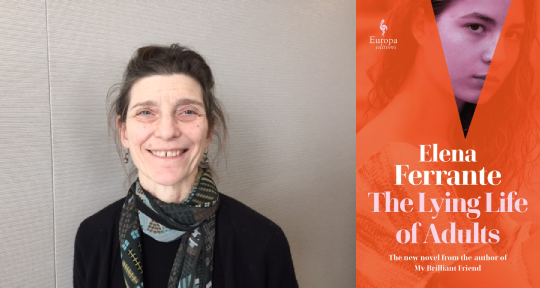The Lying Life of Adults by Elena Ferrante, translated from the Italian by Ann Goldstein, Europa Editions, 2020
Reading is and has always been spatial. Zadie Smith has said it, Henry James said it before her, and I am certain someone else said it even before him. We often enter novels as if they were houses, taking in whole rooms at once, or stopping to admire a well-positioned taboret or fix a crooked frame. Because of this, reading different novels by the same author often gives us an uncanny sense of déjà vu, the familiar feeling of a thing estranged, of perhaps entering our neighbor’s house to realize that, unlike us, they have held on to carpeted floors, or have shown a preference for impressionist art or gaudy vases, but that, fundamentally, our house and theirs were designed by the same mind. This is exactly the kind of unfamiliarity I felt as soon as I began reading The Lying Life of Adults, Elena Ferrante’s latest novel, translated by Ann Goldstein. At first glance, fans and devoted readers of Ferrante’s work will not be surprised by this novel, which reworks some of the major themes that have made the pseudonymous author a worldwide phenomenon. It traffics in urgent issues like gender and its intersections with class, the tension between the proletariat and the bourgeoisie of Naples, the perils of friendship and sexual desire, and the hypocrisy that often subtends the life of intellectuals. Ferrante isn’t exactly charting new territory here, and yet, as an undisputed master in rendering the familiar strange, her prose packs a punch just when we are about to settle into a sense of familiarity. With the publication of The Lying Life of Adults, we see an author at her peak, deftly synthetizing the density of her first three novels with the sprawling quality of the Neapolitan Novels, all while managing to uncover complex and challenging human truths.
Unlike its immensely popular predecessors, this novel does not trace a woman’s laborious ascent up the social ladder, but rather begins when the protagonist’s father has emerged victorious from the social battle and is comfortably settled into a middle-class life, which includes a position as a teacher in a prestigious liceo. The story is told in the first person, as are all of Ferrante’s novels. It’s hard to imagine otherwise at this point; prose, for her, serves as a conduit for the most rigorous kind of self-examination, often dragging us into psychic places we’d rather not inhabit. Take, for instance, the uncomfortable scene that opens the novel: Giovanna Trada, at age twelve, overhears a conversation between her parents in which her father calls her ugly. Or rather, she overhears him say that she is beginning to look like his long-estranged sister, Vittoria, a woman in whom “ugliness and spite were combined to perfection.” This aunt, whom Giovanna barely remembers ever seeing, has come to symbolize in the Trada household the squalor and indignity of the Neapolitan lower class—her name has, through the years, become a moniker for everything that Giovanna’s father has fought hard to leave behind. Thrown into disarray by her father’s words, an initiation into adulthood of sorts, Giovanna determines to establish contact with Vittoria, unleashing a series of events fated to unearth her family past and shed new light on her present. READ MORE…

